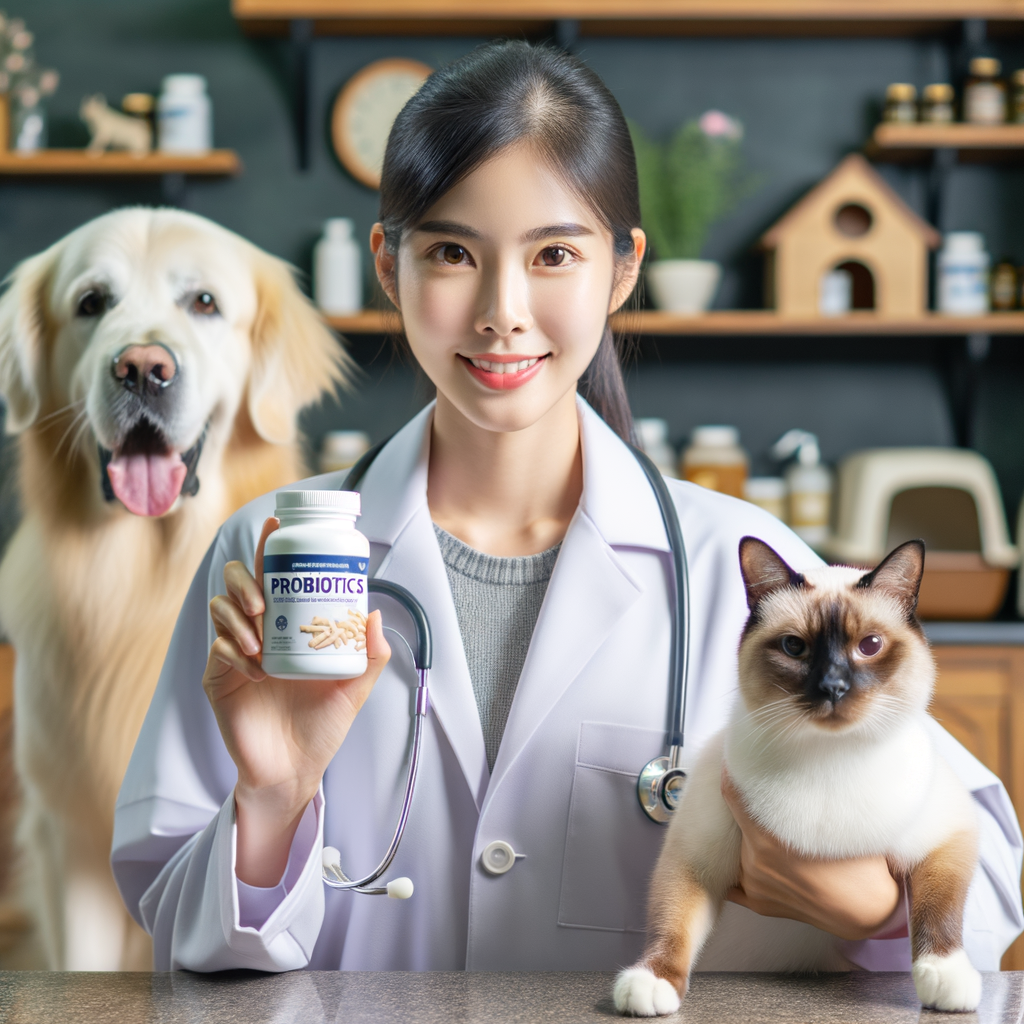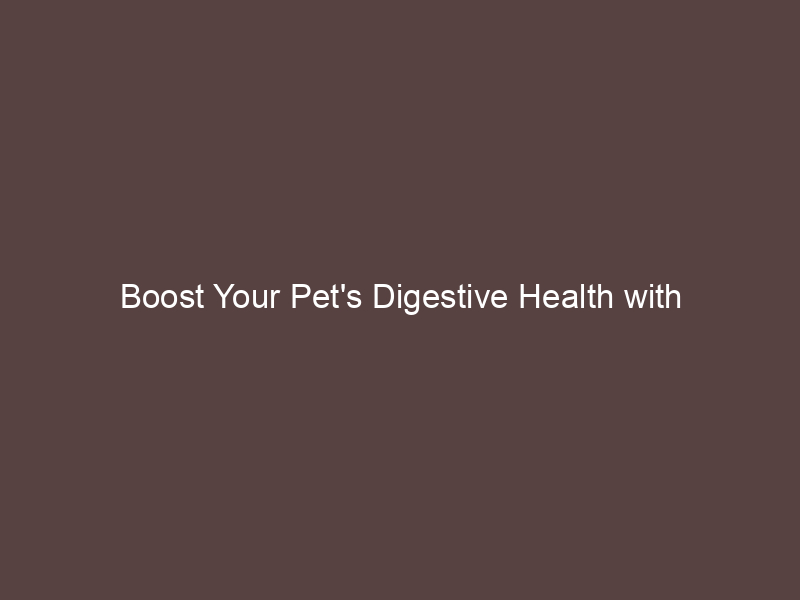
Introduction: The Importance of Pet Digestive Health
As a pet owner, it’s essential to understand that your pet’s health goes beyond its fur or teeth. One of the critical areas that often gets overlooked is digestive health. The digestive system plays a significant role in your pet’s overall health, affecting everything from nutrient absorption to the immune system. This article will help you understand the importance of pet digestive health and common digestive issues pets may face.
- Understanding the role of digestion in overall pet health
- The common digestive issues in pets
The digestive system in pets, like in humans, is responsible for breaking down food into nutrients which the body uses for energy, growth, and cell repair. It’s also a crucial part of the immune system. A healthy digestive system can help prevent various health issues, including allergies, urinary tract infections, and even certain types of cancer. Therefore, maintaining your pet’s digestive health is vital for its overall well-being.
Just like humans, pets can also suffer from a range of digestive issues. Some of the most common ones include diarrhea, constipation, vomiting, and loss of appetite. These issues can be caused by various factors, including dietary changes, stress, infection, or underlying health conditions. If your pet is experiencing any of these symptoms, it’s essential to consult with a vet to determine the cause and appropriate treatment.
In the following sections, we will delve deeper into the topic of pet digestive health, discussing probiotics for pets, their benefits, and how they can help improve your pet’s digestive health. We will also explore natural remedies for pet digestion and provide some case studies to illustrate the benefits of probiotics for animals.
Probiotics for Pets: An Overview
Just like humans, our furry friends can also benefit from the wonders of probiotics. But what are probiotics, and how do they work? Let’s dive in and explore.
- What are probiotics?
- How probiotics work in the body
- Types of probiotics for pets
Probiotics are live bacteria and yeasts that are good for health, especially the digestive system. We usually think of bacteria as something harmful, but our bodies are full of bacteria, both good and bad. Probiotics are often called “good” or “friendly” bacteria because they help keep our gut healthy.
When you lose “good” bacteria in your body (like after you take antibiotics, for example), probiotics can help replace them. They can also help balance your “good” and “bad” bacteria to keep your body working as it should. They do this by crowding out the bad bacteria in your pet’s gut, making it harder for the harmful bacteria to multiply.
There are several types of probiotics that are beneficial for pets. These include:
| Type | Benefits |
|---|---|
| Lactobacillus | Helps break down food and absorb nutrients |
| Bifidobacterium | Helps maintain a healthy balance of good bacteria in the gut |
| Enterococcus | Helps regulate the immune system and prevent infections |
In conclusion, probiotics can be a powerful tool in maintaining your pet’s digestive health. They are safe, natural, and can provide numerous benefits for your furry friends. However, it’s always best to consult with your vet before starting any new supplement regimen for your pet.
Benefits of Probiotics for Pet Digestive Health
Probiotics are beneficial bacteria that play a crucial role in maintaining the health of your pet’s digestive system. They offer a range of benefits that contribute to overall pet health. Let’s explore these benefits in detail.
- Improving digestion and nutrient absorption
Probiotics aid in the breakdown of food in your pet’s digestive tract. This process makes it easier for the nutrients in the food to be absorbed into the bloodstream. A study conducted in 2017 revealed that dogs fed a diet supplemented with probiotics showed improved nutrient absorption compared to those on a regular diet. This means that your pet gets more out of the food they eat, leading to better health and vitality.
- Boosting the immune system
Did you know that a significant portion of your pet’s immune system resides in their gut? By maintaining a healthy balance of gut bacteria, probiotics help to strengthen your pet’s immune system. A stronger immune system means your pet is better equipped to fight off disease and infection. A 2018 study found that cats given probiotics had a higher count of immune cells, indicating a stronger immune response.
- Reducing gastrointestinal issues
Probiotics can help to alleviate common gastrointestinal issues in pets, such as diarrhea, constipation, and bloating. They work by restoring a healthy balance of bacteria in the gut, which can be disrupted by factors like stress, illness, or antibiotics. In a 2016 study, dogs suffering from diarrhea showed significant improvement after being treated with probiotics.
In conclusion, probiotics play a vital role in maintaining your pet’s digestive health. They improve digestion and nutrient absorption, boost the immune system, and help to reduce gastrointestinal issues. By including probiotics in your pet’s diet, you can help ensure they live a healthier, happier life.
Probiotics for Dogs: A Closer Look
When it comes to our furry friends, their health is of utmost importance. One way to ensure they are in their best shape is by incorporating probiotics into their diet. Let’s take a closer look at the benefits of probiotics for dogs.
Benefits of Probiotics for Dogs
Probiotics are beneficial bacteria that play a significant role in maintaining the overall health of your dog. They provide a range of benefits, including:
- Improving digestion in dogs: Probiotics help to balance the gut flora, aiding in digestion and absorption of nutrients. They can also help to alleviate symptoms of gastrointestinal problems such as diarrhea, constipation, and bloating.
- Reducing dog allergies: Probiotics can help to strengthen the immune system, reducing the likelihood of allergies. They can also help to reduce inflammation, a common symptom of allergies.
- Enhancing skin and coat health: By promoting a healthy gut, probiotics can also contribute to a healthier skin and coat. They can help to reduce skin conditions such as dryness, itchiness, and rashes.
These are just a few of the many benefits that probiotics can offer to your dog. It’s important to note that while probiotics can provide these benefits, they should not replace a balanced diet and regular veterinary care. Always consult with your vet before starting any new supplement regimen for your pet.
Choosing the Right Probiotic Supplement for Dogs
When it comes to your dog’s health, choosing the right probiotic supplement is crucial. There are several factors to consider to ensure you’re providing your pet with the best possible care. Here are three key steps to follow:
- Considering the dog’s age, breed, and health condition
- Checking the probiotic strains and CFU count
- Looking for quality certifications
Just like humans, dogs have different nutritional needs depending on their age, breed, and health condition. Puppies may require different probiotics than older dogs, and certain breeds may have specific digestive needs. Additionally, dogs with health conditions such as allergies or digestive issues may benefit from specific probiotic strains. Always consult with your vet before starting any new supplement regimen.
Not all probiotics are created equal. Different probiotic strains offer different benefits, and the number of live organisms in a supplement, known as the CFU count, can greatly impact its effectiveness. Look for a supplement with multiple strains of beneficial bacteria and a high CFU count to ensure your dog is getting the most out of their probiotics.
Quality is key when it comes to probiotics. Look for products that have been tested and certified by third-party organizations. This ensures that the product meets certain standards for purity and potency. It’s also a good idea to choose a product that’s specifically designed for dogs, as they have different digestive systems than humans.
In conclusion, choosing the right probiotic for your dog involves careful consideration of their unique needs, the specifics of the probiotic supplement, and the quality of the product. By taking these factors into account, you can help support your dog’s digestive health and overall well-being.
Probiotics for Cats: A Detailed Analysis
As a pet owner, it’s essential to understand the role of probiotics in maintaining your cat’s health. Probiotics are beneficial bacteria that can be found in various types of food and supplements. They play a vital role in improving digestion, reducing hairball issues, and boosting the immune system of your feline friends.
Benefits of Probiotics for Cats
Probiotics offer several health benefits for cats. Here are some of the key benefits:
- Improving digestion in cats: Probiotics help maintain a healthy balance of bacteria in the cat’s gut. This balance aids in digestion and helps the cat absorb nutrients more efficiently. A study found that cats fed with probiotics had a healthier and more regular bowel movement compared to those without.
- Reducing hairball issues: Hairballs can be a common issue in cats, especially those with long hair. Probiotics can help by improving digestion and reducing the likelihood of hairballs forming in the digestive tract.
- Boosting immune health in cats: A healthy gut is crucial for a strong immune system. Probiotics support the immune system by maintaining a healthy gut environment. This can help your cat fight off infections and diseases more effectively.
It’s important to note that while probiotics can provide these benefits, they are not a substitute for a balanced diet and regular veterinary care. Always consult with your vet before starting any new supplement regimen for your cat.
Choosing the Right Probiotic Supplement for Cats
When it comes to the health of your feline friend, choosing the right probiotic supplement is crucial. There are a few key factors to consider to ensure you’re making the best choice for your cat’s unique needs.
- Considering the cat’s age, breed, and health condition
- Checking the probiotic strains and CFU count
- Looking for quality certifications
Just like humans, cats have different nutritional needs depending on their age, breed, and overall health. Kittens may need different probiotics than older cats. Certain breeds may also have specific digestive needs. If your cat has a health condition, such as a sensitive stomach or chronic digestive issues, a specialized probiotic may be necessary. Always consult with your vet before starting any new supplement regimen.
Not all probiotics are created equal. The strains of bacteria and the Colony Forming Units (CFU) count can greatly affect the effectiveness of the supplement. Look for a supplement with multiple strains of beneficial bacteria. The CFU count, which is the number of live and active microbes in the supplement, should be high enough to be effective but not so high as to overwhelm your cat’s system.
Quality is key when it comes to probiotics. Look for products that have been third-party tested for purity and potency. Certifications from reputable organizations can provide peace of mind that the product you’re giving your cat is safe and effective.
Remember, every cat is unique and what works for one may not work for another. It’s always best to consult with a veterinary professional when making decisions about your cat’s health. With the right probiotic supplement, you can help support your cat’s digestive health and overall well-being.
Natural Remedies for Pet Digestion
Just like humans, pets can also experience digestive issues. However, there are natural remedies that can help improve your pet’s digestion. Let’s explore some of these remedies:
- Dietary changes for better digestion
- Herbs and natural supplements
- Exercise and its impact on digestion
One of the most effective ways to improve your pet’s digestion is by making changes to their diet. Feeding your pet a balanced diet that includes high-quality proteins, healthy fats, and a variety of fruits and vegetables can significantly improve their digestive health. For instance, adding fiber-rich foods like pumpkin or sweet potatoes to your pet’s diet can help regulate their bowel movements. Always remember to introduce new foods gradually to avoid upsetting your pet’s stomach.
There are several herbs and natural supplements that can aid in pet digestion. For example, ginger is known for its ability to soothe upset stomachs and can be safely given to pets in small amounts. Other beneficial herbs include peppermint and fennel, which can help reduce bloating and gas. Additionally, probiotics are a type of natural supplement that can promote a healthy gut environment by introducing beneficial bacteria. However, it’s important to consult with a vet before introducing any new supplements into your pet’s diet.
Regular exercise is another key factor in maintaining good digestive health for pets. Exercise helps stimulate the natural contraction of intestinal muscles, which aids in the digestion process. Whether it’s a daily walk for your dog or playtime for your cat, ensuring your pet gets plenty of physical activity can greatly improve their digestive health. Remember, the amount and type of exercise suitable for your pet can vary based on their age, breed, and health status, so it’s best to consult with a vet for personalized advice.
In conclusion, dietary changes, herbs and natural supplements, and regular exercise can all contribute to better digestion for your pet. However, always consult with a vet before making any significant changes to your pet’s routine or diet. By taking these steps, you can help ensure your pet’s digestive system remains healthy and robust.
Case Studies: Probiotic Benefits for Animals
Let’s delve into some real-life examples that illustrate the benefits of probiotics for our furry friends. We’ll look at two case studies: one focusing on improving dog digestion with probiotics, and the other on using probiotics to alleviate cat allergies.
- Case Study 1: Improving Dog Digestion with Probiotics
- Case Study 2: Probiotics for Cat Allergies
Meet Max, a 5-year-old Golden Retriever who had been suffering from chronic digestive issues. His owner, Jane, tried various diets and medications, but nothing seemed to work. Then, she decided to try a probiotic supplement specifically designed for dogs.
After a few weeks of daily probiotic use, Jane noticed a significant improvement in Max’s digestion. His bouts of diarrhea were less frequent, and he seemed more comfortable overall. Jane reported that Max appeared happier and more energetic, indicating an improvement in his overall well-being.
This case study highlights the potential of probiotics in aiding digestion and improving the quality of life for dogs like Max.
Next, let’s consider the case of Bella, a 3-year-old domestic shorthair cat. Bella’s owner, Mike, noticed that she was frequently scratching and had red, irritated skin. After a vet visit, Mike learned that Bella was suffering from allergies.
On the vet’s recommendation, Mike started giving Bella a daily probiotic supplement designed for cats. Over time, Bella’s skin condition improved, and her scratching decreased. Mike was relieved to see Bella more comfortable and less distressed.
This case study demonstrates how probiotics can help manage allergies in cats, providing them with much-needed relief.
These case studies provide compelling evidence of the potential benefits of probiotics for pets. However, it’s important to remember that every pet is unique. What works for one may not work for another. Always consult with a veterinarian before starting any new supplement regimen for your pet.
Key Takeaways: Boosting Your Pet’s Digestive Health with Probiotics
As we conclude our discussion on pet digestive health, let’s recap the essential points we’ve covered. These key takeaways will guide you in maintaining your pet’s digestive health using probiotics.
- The Importance of Probiotics in Pet Health
- Choosing the Right Probiotic Supplement
- Complementing Probiotics with a Healthy Lifestyle
Probiotics play a crucial role in your pet’s health. They are beneficial bacteria that aid in digestion and nutrient absorption. They also help to strengthen your pet’s immune system, preventing harmful bacteria from causing diseases. A pet with a healthy gut is generally happier, more active, and less likely to suffer from digestive disorders.
Not all probiotic supplements are created equal. It’s essential to choose a product specifically designed for pets, as human probiotics may not provide the same benefits. Look for a supplement that contains multiple strains of beneficial bacteria and has been clinically tested for safety and efficacy. Always consult with your vet before starting any new supplement regimen.
While probiotics are beneficial, they are not a magic cure-all. They should be part of a comprehensive health plan that includes a balanced diet, regular exercise, and routine veterinary check-ups. Remember, a healthy lifestyle is the best way to ensure your pet’s overall well-being.
In conclusion, probiotics can significantly improve your pet’s digestive health. However, it’s important to choose the right supplement and complement it with a healthy lifestyle. By doing so, you can help your furry friend live a happier, healthier life.
| Key Point | Details |
|---|---|
| Probiotics in Pet Health | Beneficial bacteria that aid digestion and boost the immune system. |
| Choosing a Probiotic Supplement | Choose a pet-specific product with multiple strains of bacteria. Consult with a vet before use. |
| Healthy Lifestyle | Probiotics should be part of a comprehensive health plan including a balanced diet, exercise, and regular vet check-ups. |






